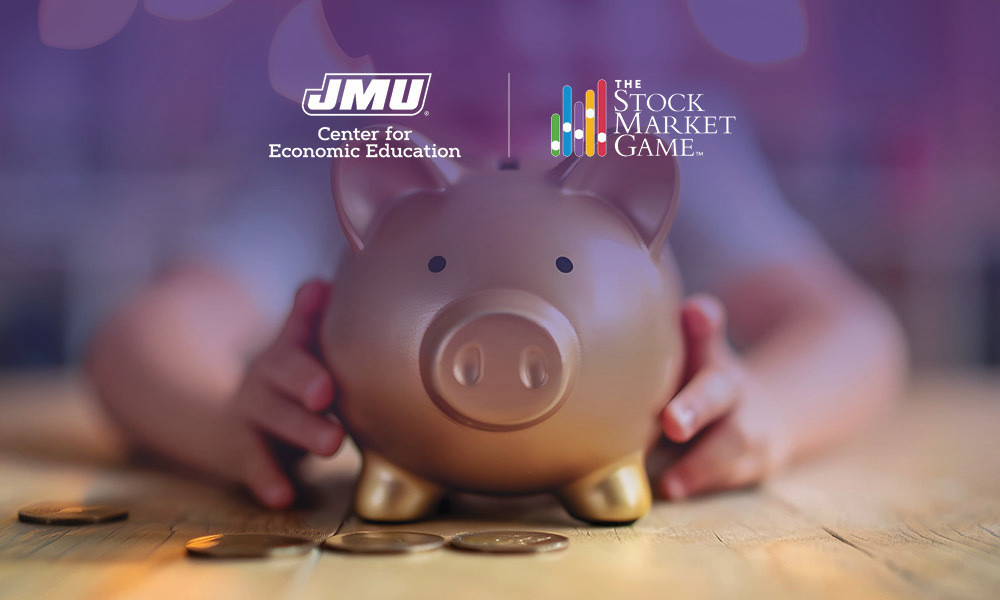News Article Display Name
News
SUMMARY: Local public school students and educators reap the benefits of implementing the Stock Market Game in their classrooms and lesson plans.
The earlier in life you start to learn something, the better you’ll be at it when you’re older. At least that’s the goal of hundreds of local elementary, middle- and high-school students who are currently playing the Stock Market Game in their classrooms. The cyber-game, designed to teach students about investing and managing a stock portfolio, gives students $100,000 of “play money” to spend while learning how to invest, grow and sustain their holdings.
JMU’s Center for Economic Education, in partnership with Your Economic Success, a local nonprofit dedicated to promoting economic wellness in the Shenandoah Valley, works closely with local educators, training and teaching them how to implement the Stock Market Game in their classrooms. While the game is nationwide in scope, Virginia’s involvement in it is supported by the Virginia Council on Economic Education.
CEE Assistant Director Lauren Shifflett explained that, “Students work together to manage virtual investment portfolios using the actual stock market.” This means they must adhere to all of the real rules and regulations — such as no trades after 4 p.m. “The idea is for the students to be able to see how to invest their money to determine a long-term and short-term goal, and see if they can make their money grow.”
Teachers have the option to organize their students into teams or play as a whole class. But throughout the game, students work together to buy, sell, short or hold stocks, bonds and mutual funds. Shifflett said there are no restrictions on which company’s stock students can use. “We ask them to go with the trends of the time, so come the fall many will choose candy companies in preparation for Halloween,” Shifflett said. “Another year, we said they had to find something that was meaningful for them. One of the students’ moms had cancer, so they focused on cancer drugs that were made by Merck,” a company with manufacturing operations here in the Harrisonburg area. “Some students are able to find a personal connection and they like to see just how much money they can make.”
Kate Hollenberg, a Broadway High School math and economics teacher, said there is no better way to learn something than by actually doing it, especially something that is new and unfamiliar. “The vocabulary alone associated with investing is hard enough to learn, but by playing the game, students get to see and use the vocabulary in context as they talk with their teams about investing strategies,” she said.
The Stock Market Game was created in 1977 and has since reached 22 million students, according to its website. More than 600,000 students take part every school year across all 50 states. JMU’s CEE supports a fraction of that, encompassing Harrisonburg and Rockingham County, as well as adjoining localities from Winchester to Bath County to Charlottesville and Albemarle County. During the 2023-24 school year, 1,416 students and 34 teachers from the CEE’s assigned region participated in the game. This includes Harrisonburg High School, Broadway High School, Honey Run Elementary, Leslie Walton Middle School, Grace Christian School, and so many more.
While the main goal of the Stock Market Game is to elevate students’ understanding of how to make their money grow through investment, there are many more benefits that come from participating in the game. Shifflett said that, “While economic education is a big part of the lessons, they’re also learning math skills and preparing themselves for the future. It’s helping them understand how to use these skills outside of the classroom when they get into the real world. This is the space where they can experiment and learn without the risk of losing any real dollars.”
Hollenberg echoed Shifflett’s sentiment, saying, “Students get to experience firsthand the differences between stocks, bonds and mutual funds. They learn about capital gains versus capital losses, how SEC fees and broker commissions can affect their overall equity, and what an investment portfolio is and looks like. They also learn when to buy versus when to sell and the value of diversification. Some students really get into it, while others just dabble. However, I hope that no matter what, they feel confident in understanding all the risks, rewards, and challenges associated with investing in both the Stock Market Game and the real world.”
While there are no true “winners,” those who make and retain the most money by the end of the game period are honored by the CEE at a reception held on JMU’s campus in May. Additionally, students and schools that win at the state level have the opportunity to be recognized at the Federal Reserve Bank of Richmond.
The Stock Market Game not only equips students with valuable knowledge about investing and financial literacy but also fosters critical thinking, teamwork and real-world applications of academic concepts. Through the guidance of dedicated educators and the support of organizations like the Center for Economic Education and Your Economic Success, students are empowered to explore the intricacies of the stock market in a safe and educational environment. As they navigate the ups and downs of investing, they gain confidence and skills that will serve them well beyond the classroom, preparing them for the challenges and opportunities of the future financial landscape.
